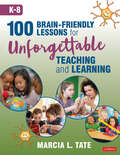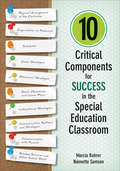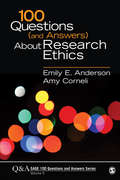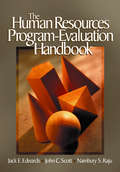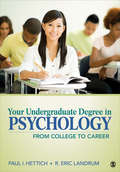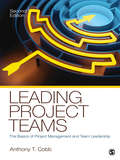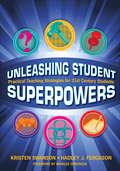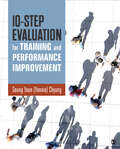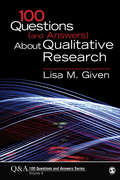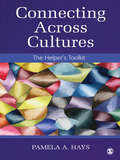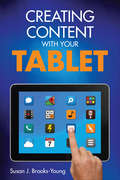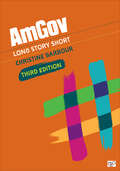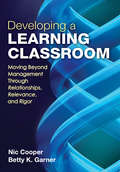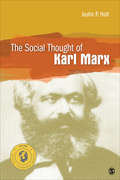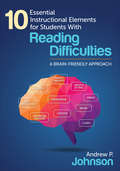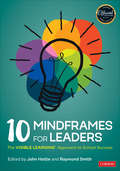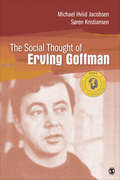- Table View
- List View
100 Brain-Friendly Lessons for Unforgettable Teaching and Learning (K-8)
by Marcia L. TateUse research- and brain-based teaching to engage students and maximize learning Lessons should be memorable and engaging. When they are, student achievement increases, behavior problems decrease, and teaching and learning are fun! In 100 Brain-Friendly Lessons for Unforgettable Teaching and Learning K-8, best-selling author and renowned educator and consultant Marcia Tate takes her bestselling Worksheets Don’t Grow Dendrites one step further by providing teachers with ready-to-use lesson plans that take advantage of the way that students really learn. Readers will find 100 cross-curricular sample lessons from each of the four major content areas: English/language arts, mathematics, science, and social studies. Plans designed around the most frequently taught objectives found in national and international curricula. Lessons educators can immediately replicate in their own classrooms or use to develop their own. 20 brain-compatible, research-based instructional strategies that work for all learners. Five questions that teachers should ask and answer when planning brain-compatible lessons and an in-depth explanation of each of the questions. Guidance on building relationships with students that enable them to learn at optimal levels. It is a wonderful time to be a teacher! This hands-on resource will show you how to use what we know about educational neuroscience to transform your classroom into a place where success if accessible for all.
10 Critical Components for Success in the Special Education Classroom: Gargiulo: Special Education In A Contemporary Society 5e + Rohrer: 10 Critical Components For Success In The Special Education Classroom
by Marcia W. Rohrer Nannette M. SamsonYour blueprint for building structure, consistency, and accountability year-round! Often teachers of all experience levels struggle to effectively manage special education classrooms. In this must-have guide, Rohrer and Sampson provide a solid, workable action plan to ensure measurable success for even your most challenging student. Discover a variety of research-based instructional strategies to: Support all students, including those with autism and severe learning disabilities Organize your classroom, materials, and staff and student schedules for optimal teaching and learning Execute well-planned standards-based lessons, annual IEP’s, PLAALP’s, behavioral interventions, and visual supports Develop communication and social skills within a language-rich environment Foster parent communication and staff collaboration Packed with real-world examples, free tools to use and share, a list of resources and a helpful glossary, this dynamic resource will inspire you, develop your teacher toolbox, and ensure your students are on the path to achievement! "10 Critical Components for Success in the Special Education Classroom offers practical and easy-to-use ideas for organizing your physical classroom space, materials, student and staff schedules. Readers will also receive well thought out strategies that will definitely aid in the ultimate end result—student success!" —Avis Canty, Special Education Teacher Tanglewood Middle School, Greenville, SC "The path to success for students with autism and intellectual disabilities starts here, when their teachers implement the essential critical components outlined in this book." —Renee Bernhardt, Learning Support for Special Education and RTI Cherokee County School District, Canton, GA
100 Questions (SAGE 100 Questions and Answers #5)
by Emily E. Anderson Amy L. Corneli100 Questions (and Answers) About Research Ethics is an essential guide for graduate students and researchers in the social and behavioral sciences. It identifies ethical issues that individuals must consider when planning research studies as well as provides guidance on how to address ethical issues that might arise during research implementation. Questions such as assessing risks, to protecting privacy and vulnerable populations, obtaining informed consent, using technology including social media, negotiating the IRB process, and handling data ethically are covered. Acting as a resource for students developing their thesis and dissertation proposals and for junior faculty designing research, this book reflects the latest U.S. federal research regulations to take effect mostly in January 2018.
The Human Resources Program-Evaluation Handbook
by John C. Scott Nambury S. Raju Jack E. EdwardsTechnological advances and rapid changes in workforce demographics pose extensive challenges to human resources program evaluators. But little has been done to document successful human resources program assessment and implementation strategies. The Human Resources Program-Evaluation Handbook is the first book to present state-of-the-art procedures for evaluating and improving human resources programs. Editors Jack E. Edwards, John C. Scott, and Nambury S. Raju provide a user-friendly yet scientifically rigorous "how to" guide to organizational program-evaluation. Integrating perspectives from a variety of human resources and organizational behavior programs, a wide array of contributing professors, consultants, and governmental personnel successfully link scientific information to practical application. Offering authoritative guidance to both novice and experienced program evaluators, this unique guidebook includes New perspectives on organizational program-evaluation Methods to assess the efficiency of human resources programs Identification of potential pitfalls Real-life examples Additional references for program-evaluation best practices The Human Resources Program-Evaluation Handbook provide program-evaluation teams with content-specific guidance. Supplying useful and accurate evaluation techniques, the editors present a manual for enhancing the effectiveness and efficiency of most major types of human resources programs. Designed for academics and graduate students in industrial-organizational psychology, human resources management, and business, the handbook is also an essential resource for human resources professionals, consultants, and policy makers.
Your Undergraduate Degree in Psychology: From College to Career
by R. Eric Landrum Paul I. HettichInnovative strategies for psychology majors to survive and thrive in the workforceNearly 100,000 students graduate each year with a bachelor′s degree in psychology, and a majority of these students will enter the workforce instead of pursuing a graduate degree. Many will find themselves tentatively deciding their next steps amid a complex and changing economic and job environment.In this text, authors and professors Paul I. Hettich and R. Eric Landrum provide innovative strategies and tools for succeeding after college with an undergraduate degree in psychology. Drawing on current research data, applied theory, and both academic and workplace experiences, they help stimulate self-reflection and improve decision making as students approach their careers. The text covers key topics in the college-to-career transition, including career planning and development, identifying and transferring marketable skills, building and sustaining strong networks, understanding what employers want and don′t want, coping with personal life changes, becoming a valued employee, and more.
Leading Project Teams: The Basics of Project Management and Team Leadership
by Anthony T. CobbThis practical book provides entry-level project tools and skills for newcomers to project management. It helps student teams become more effective at doing course projects by learning and applying project management tools and techniques. It also provides invaluable skills that students can utilize when they enter the workplace. Chapters focusing on project initiation and planning are followed by coverage of the human resource issues involved in project leadership and how to write up project reports. Appendices introduce the use of earned value analysis and show how critical paths are calculated.
Leading Project Teams: The Basics of Project Management and Team Leadership
by Anthony T. CobbThis practical book provides entry-level project tools and skills for newcomers to project management. It helps student teams become more effective at doing course projects by learning and applying project management tools and techniques. It also provides invaluable skills that students can utilize when they enter the workplace. Chapters focusing on project initiation and planning are followed by coverage of the human resource issues involved in project leadership and how to write up project reports. Appendices introduce the use of earned value analysis and show how critical paths are calculated.
Unleashing Student Superpowers: Practical Teaching Strategies for 21st Century Students
by Kristen N. Swanson Hadley J. FergusonTurn students into learning superheroes! Like we see in the movies, no two superheroes learn to use their powers in the exact same way. Each of your students has superpowers hidden inside, and you hold the keys to unlock them. With this cutting-edge handbook, you’ll turn your classroom into a place where students don’t just receive an education—they use their powers to create it. Discover specific, ready-to-use instructional journeys designed to foster an inquiry-based, student-driven learning environment. Each research-based journey Supports one of the six student superpowers: Wondering, Curating, Designing, Digital Inking, Gaming, and Connecting Encourages students to think deeply; as required by the CCSS and NGSS Includes step-by-step lesson frameworks, aligned with the Common Core, that fit into your regular day Tear through the obstacles of achievement and show your students that anything is possible! "Ferguson and Swanson explain why tapping into student competencies is imperative and show the road-map for matching engaging activities to specific standards. So many books on the market explain why a shift is needed; this one gives you the tools to do it." —Erin Klein, Teacher Michigan Reading Association, Bloomfield Hills "Unleashing Student Superpowers is an amazing resource for the creation and enhancement of student-centered classroom environments that focus on high-level questioning, inquiry, and passion-based learning. Each Superpower theme provides linkages to the Common Core and flexible lesson plans that promote relevant skills for students’ learning." —Victoria Olson, Teacher West Langley Elementary School, Canada
10-Step Evaluation for Training and Performance Improvement
by Seung Youn ChyungWritten with a learning-by-doing approach in mind, 10-Step Evaluation for Training and Performance Improvement gives students actionable instruction for identifying, planning, and implementing a client-based program evaluation. The book introduces readers to multiple evaluation frameworks and uses problem-based learning to guide them through a 10-step evaluation process. As students read the chapters, they produce specific deliverables that culminate in a completed evaluation project.
100 Questions (SAGE 100 Questions and Answers)
by Lisa M. GivenExploring 100 key questions (and answers) on the nature and practice of qualitative inquiry, this unique book addresses the practical decisions that researchers must make in their work, from the design of the study, through ethics approval, implementation, and writing. The book’s quick-scan, question-and-answer format make it ideal as a supplementary text or as a ready reference for graduate students preparing for comprehensive exams and writing research proposals, undergraduates in affiliated programs who will not be taking a primary course in qualitative research methods, and researchers working across disciplines in academic or practice environments.
Connecting Across Cultures: The Helper′s Toolkit
by Pamela A. HaysChock-full of fun exercises, surprising tips, and real-world case examples, Connecting Across Cultures: The Helper′s Toolkit provides both students and professionals in health care, education, and social services with the skills to develop respectful, smooth relationships with clients and the community at large. The book offers communication tools to defuse defensive interactions, resolve conflicts constructively, and engage respectfully. Written in a warm, inviting style, the author shares her own mistakes as she explains what not to do and how to do it better. The book provides practical, hands-on strategies for connecting with people across differences related to ethnicity, religion, nationality, sexual orientation, disability, age, gender, and class. Because cross-cultural relationships involve extra challenges, this book will help you with almost every relationship you encounter.
100 Questions (SAGE 100 Questions and Answers)
by Lisa M. GivenExploring 100 key questions (and answers) on the nature and practice of qualitative inquiry, this unique book addresses the practical decisions that researchers must make in their work, from the design of the study, through ethics approval, implementation, and writing. The book’s quick-scan, question-and-answer format make it ideal as a supplementary text or as a ready reference for graduate students preparing for comprehensive exams and writing research proposals, undergraduates in affiliated programs who will not be taking a primary course in qualitative research methods, and researchers working across disciplines in academic or practice environments.
Creating Content With Your Tablet
by Susan J. Brooks-YoungTransform students from content consumers to content creators! This comprehensive guide gets to the heart of effective mobile technology use in today’s classroom. Internationally recognized education expert Susan Brooks-Young provides manageable, research-based strategies to help teachers and administrators: Confidently plan and manage mobile technology activities across grade levels Explore new uses and applications for multiple devices Use rubrics and checklists to evaluate appropriate, cross-platform educational apps Manage content-specific tablet use in learning centers or small groups Tap student ingenuity and improve critical thinking skills Time-saving tips cover a wide range of apps to help busy teachers easily incorporate tablets into daily classroom use. Includes step-by-step instructions across content areas for digital photography, video, ePublishing, QR codes and more. Transform students from content consumers to content creators with this must-have resource! "Creating Content With Your Tablet provides educators with simple, easy steps to implement tablet technology with the Common Core Standards. I am encouraged to try the apps in this book. It makes the connection between modern technology and what teachers are already doing in the classroom seem seamless." —Michelle Strom, Language Arts Teacher Fort Riley Middle School, KS "Very practical. The discussion questions at the end of each chapter are excellent for a book study or district that is moving towards tablet implementation." —David Fife, Vice Principal Tweedsmuir Public School, London, Ontario, Canada
100 Brain-Friendly Lessons for Unforgettable Teaching and Learning (K-8)
by Marcia L. TateUse research- and brain-based teaching to engage students and maximize learning Lessons should be memorable and engaging. When they are, student achievement increases, behavior problems decrease, and teaching and learning are fun! In 100 Brain-Friendly Lessons for Unforgettable Teaching and Learning K-8, best-selling author and renowned educator and consultant Marcia Tate takes her bestselling Worksheets Don’t Grow Dendrites one step further by providing teachers with ready-to-use lesson plans that take advantage of the way that students really learn. Readers will find 100 cross-curricular sample lessons from each of the four major content areas: English/language arts, mathematics, science, and social studies. Plans designed around the most frequently taught objectives found in national and international curricula. Lessons educators can immediately replicate in their own classrooms or use to develop their own. 20 brain-compatible, research-based instructional strategies that work for all learners. Five questions that teachers should ask and answer when planning brain-compatible lessons and an in-depth explanation of each of the questions. Guidance on building relationships with students that enable them to learn at optimal levels. It is a wonderful time to be a teacher! This hands-on resource will show you how to use what we know about educational neuroscience to transform your classroom into a place where success if accessible for all.
AmGov: Long Story Short
by Christine BarbourAll the fundamentals. No fluff. Learn more with less! AmGov: Long Story Short helps students learn the nuts and bolts of American Government. Unlike competitors, this bestseller responds to the need for quick studying and skimming with ten succinct chapters that make it easy to read, revisit, and return to content quickly. Reading aids like bullets, annotations, and arrows walk students through important facts and break up the material in short, engaging bites of information. Though brief, the Third Edition of this core book is still robust and current enough to provide everything that students need to be successful in their American Government course. Whether for the on-the-go student who doesn’t have time to read and digest a lengthy chapter, or for the instructor who wants a book that will stay out of their way and leave room for plenty of supplementary reading and activities, AmGov provides a perfectly simplified foundation for a successful American Government course. This title is accompanied by a complete teaching and learning package. Contact your SAGE representative to request a demo. Learning Platform / Courseware SAGE Vantage is an intuitive learning platform that integrates quality SAGE textbook content with assignable multimedia activities and auto-graded assessments to drive student engagement and ensure accountability. Unparalleled in its ease of use and built for dynamic teaching and learning, Vantage offers customizable LMS integration and best-in-class support. It’s a learning platform you, and your students, will actually love. Learn more. Assignable Video with Assessment Assignable video (available in SAGE Vantage) is tied to learning objectives and curated exclusively for this text to bring concepts to life. Watch a sample video now. LMS Cartridge: Import this title’s instructor resources into your school’s learning management system (LMS) and save time. Don’t use an LMS? You can still access all of the same online resources for this title via the password-protected Instructor Resource Site. Learn more.
10-Step Evaluation for Training and Performance Improvement
by Seung Youn ChyungWritten with a learning-by-doing approach in mind, 10-Step Evaluation for Training and Performance Improvement gives students actionable instruction for identifying, planning, and implementing a client-based program evaluation. The book introduces readers to multiple evaluation frameworks and uses problem-based learning to guide them through a 10-step evaluation process. As students read the chapters, they produce specific deliverables that culminate in a completed evaluation project.
100 Questions (SAGE 100 Questions and Answers #5)
by Emily E. Anderson Amy L. Corneli100 Questions (and Answers) About Research Ethics is an essential guide for graduate students and researchers in the social and behavioral sciences. It identifies ethical issues that individuals must consider when planning research studies as well as provides guidance on how to address ethical issues that might arise during research implementation. Questions such as assessing risks, to protecting privacy and vulnerable populations, obtaining informed consent, using technology including social media, negotiating the IRB process, and handling data ethically are covered. Acting as a resource for students developing their thesis and dissertation proposals and for junior faculty designing research, this book reflects the latest U.S. federal research regulations to take effect mostly in January 2018.
Unleashing Student Superpowers: Practical Teaching Strategies for 21st Century Students
by Kristen N. Swanson Hadley J. FergusonTurn students into learning superheroes! Like we see in the movies, no two superheroes learn to use their powers in the exact same way. Each of your students has superpowers hidden inside, and you hold the keys to unlock them. With this cutting-edge handbook, you’ll turn your classroom into a place where students don’t just receive an education—they use their powers to create it. Discover specific, ready-to-use instructional journeys designed to foster an inquiry-based, student-driven learning environment. Each research-based journey Supports one of the six student superpowers: Wondering, Curating, Designing, Digital Inking, Gaming, and Connecting Encourages students to think deeply; as required by the CCSS and NGSS Includes step-by-step lesson frameworks, aligned with the Common Core, that fit into your regular day Tear through the obstacles of achievement and show your students that anything is possible! "Ferguson and Swanson explain why tapping into student competencies is imperative and show the road-map for matching engaging activities to specific standards. So many books on the market explain why a shift is needed; this one gives you the tools to do it." —Erin Klein, Teacher Michigan Reading Association, Bloomfield Hills "Unleashing Student Superpowers is an amazing resource for the creation and enhancement of student-centered classroom environments that focus on high-level questioning, inquiry, and passion-based learning. Each Superpower theme provides linkages to the Common Core and flexible lesson plans that promote relevant skills for students’ learning." —Victoria Olson, Teacher West Langley Elementary School, Canada
Developing a Learning Classroom: Moving Beyond Management Through Relationships, Relevance, and Rigor
by Ned A. Cooper Betty K. GarnerDiscover powerful ways to connect with your students!All too often, managing a classroom means gaining control, dictating guidelines, and implementing rules. Designed for any teacher struggling with student behavior, motivation, and engagement, Developing a Learning Classroom explores how to create a thriving, learning-centered classroom through three critical concepts?relationships, relevance, and rigor. Discover how you can:Develop an interactive learning mindsetCreate a safe environment where students question, explore, and discover Uncover a student′s learning profile as well as your own teaching styleUse student input to create classroom practices and procedures Apply brain-based instructional strategies to keep students engagedUse student surveys and a personal education plan to improve learning environmentsFilled with classroom stories, starter worksheets, and action steps, this book reveals the secrets to transforming an ordinary classroom into an extraordinary learning community!
The Social Thought of Karl Marx (Social Thinkers Series)
by Justin P. HoltPart of the SAGE Social Thinkers series, this brief and clearly-written book provides a concise introduction to the work, life, and influences of Karl Marx, one of the most revered, reviled, and misunderstood figures in modern history. The book serves as an excellent introduction to the full range of Marx’s major themes—alienation, economics, social class, capitalism, communism, materialism, environmental sustainability—and considers the extent to which they are relevant today. It is ideal for use as a self-contained volume or in conjunction with other sociological theory textbooks.
10 Essential Instructional Elements for Students With Reading Difficulties: A Brain-Friendly Approach
by Andrew P. JohnsonBrain-friendly strategies to help all students become lifelong readers Learning to read is more than just an educational issue; it’s a social justice issue. Did you know that struggling readers are twice as likely as their peers to drop out of high school? Through time-tested, research-based neurocognitive teaching strategies, 10 Essential Instructional Elements for Students with Reading Difficulties will enable you to hone readers’ skills and help students from all grade levels develop their ability to create meaning from print. Drawing from five key areas of neurocognitive research, Andrew Johnson provides a ten-point teaching strategy that encompasses vocabulary, fluency, comprehension, writing and more. A key resource for creating intervention plans for struggling readers, features include: Information on the often-overlooked importance of emotions in the process of overcoming reading struggles Strategies to promote voluntary reading, even for the most reluctant students Useful resources such as graphic organizers, additional reading and writing activities, and QR codes that link to videos Use these strategies today and you can count on more students leaving your classrooms as fluent, lifelong readers. "Dr. Johnson tells the story of reading in a logical and clear manner with a book that is excellently researched, immaculately referenced, and full of practical tips for the practitioner." Terry Bernstein, Former Senior Literacy Difficulties Specialist London Boroughs of Camden and Westminster, UK "This is the text I wish I had when I began to teach. Dr. Johnson clearly illustrates the process our brain uses to create meaning from text." Marty Duncan, Ed.D., Author and Former Educator
10 Mindframes for Leaders: The Visible Learning Approach to School Success
by Raymond Smith John HattieIt’s not what you do, it’s how you think about what you do. Mindframes—your internal set of beliefs about your role as school leader—determine the high-impact leadership practices you choose to implement. In other words, how you think about the impact of the actions you take has more effect on student achievement than your leadership practices themselves. Building on over twenty-five years of Visible Learning research and girded by a theory of action that ensures school leaders have the expertise to select, implement, and evaluate high impact interventions, 10 Mindframes for Leaders: The VISIBLE LEARNING® Approach to School Success brings the mindframes of ten world-renowned educators to life. Ten chapters, each written by a different thought leader, detail a mindframe at the heart of successful school leadership, along with the high probability influences that make each mindframe visible. A must-have resource for any educator working toward student achievement at ever-higher levels, each chapter includes: • The most current, up-to-date findings from the Visible Learning research, including the factors from Visible Learning that support each mindframe • Practical ideas for leaders to implement high-impact strategies in classrooms and schools • Vignettes, questions, insights, and exercises to help educators clarify and refine their own mindframes Lead your school to reform from the inside out. Cultivate these ways of thinking, and you’re more likely to have major impacts on the learning lives of those students entrusted to your care. Includes Contributions From…John Hattie, Peter DeWitt, Raymond L. Smith, Doug Fisher, Janet Clinton, Nancy Frey, Dylan Wiliam, Dominique Smith, Jenni Donohoo, Laura Link, Michael Fullan, Sugata Mitra, Zaretta Hammond, Jim Knight
The Social Thought of Erving Goffman (Social Thinkers Series)
by Michael Hviid Jacobsen Soren KristiansenPart of the SAGE Social Thinker series, this book serves as a concise and inviting introduction to the life and works of Erving Goffman, one of the most prominent social theorists in postwar sociology. Goffman’s ideas continue to influence scholars in various fields and have also attracted many readers outside conventional academia. Goffman’s overall research agenda was the exploration of what he termed the interaction order—that is, the micro social order that regulates the co-mingling of people in each other’s immediate presence. He coined several new concepts (face-work, impression management, role distance, civil inattention, etc.) with which to grasp and understand the complexities and basic social restructuring of everyday life, many of which are now part of sociology’s standard vocabulary.
The Human Resources Program-Evaluation Handbook
by John C. Scott Nambury S. Raju Jack E. EdwardsTechnological advances and rapid changes in workforce demographics pose extensive challenges to human resources program evaluators. But little has been done to document successful human resources program assessment and implementation strategies. The Human Resources Program-Evaluation Handbook is the first book to present state-of-the-art procedures for evaluating and improving human resources programs. Editors Jack E. Edwards, John C. Scott, and Nambury S. Raju provide a user-friendly yet scientifically rigorous "how to" guide to organizational program-evaluation. Integrating perspectives from a variety of human resources and organizational behavior programs, a wide array of contributing professors, consultants, and governmental personnel successfully link scientific information to practical application. Offering authoritative guidance to both novice and experienced program evaluators, this unique guidebook includes New perspectives on organizational program-evaluation Methods to assess the efficiency of human resources programs Identification of potential pitfalls Real-life examples Additional references for program-evaluation best practices The Human Resources Program-Evaluation Handbook provide program-evaluation teams with content-specific guidance. Supplying useful and accurate evaluation techniques, the editors present a manual for enhancing the effectiveness and efficiency of most major types of human resources programs. Designed for academics and graduate students in industrial-organizational psychology, human resources management, and business, the handbook is also an essential resource for human resources professionals, consultants, and policy makers.
10 Critical Components for Success in the Special Education Classroom: Gargiulo: Special Education In A Contemporary Society 5e + Rohrer: 10 Critical Components For Success In The Special Education Classroom
by Marcia W. Rohrer Nannette M. SamsonYour blueprint for building structure, consistency, and accountability year-round! Often teachers of all experience levels struggle to effectively manage special education classrooms. In this must-have guide, Rohrer and Sampson provide a solid, workable action plan to ensure measurable success for even your most challenging student. Discover a variety of research-based instructional strategies to: Support all students, including those with autism and severe learning disabilities Organize your classroom, materials, and staff and student schedules for optimal teaching and learning Execute well-planned standards-based lessons, annual IEP’s, PLAALP’s, behavioral interventions, and visual supports Develop communication and social skills within a language-rich environment Foster parent communication and staff collaboration Packed with real-world examples, free tools to use and share, a list of resources and a helpful glossary, this dynamic resource will inspire you, develop your teacher toolbox, and ensure your students are on the path to achievement! "10 Critical Components for Success in the Special Education Classroom offers practical and easy-to-use ideas for organizing your physical classroom space, materials, student and staff schedules. Readers will also receive well thought out strategies that will definitely aid in the ultimate end result—student success!" —Avis Canty, Special Education Teacher Tanglewood Middle School, Greenville, SC "The path to success for students with autism and intellectual disabilities starts here, when their teachers implement the essential critical components outlined in this book." —Renee Bernhardt, Learning Support for Special Education and RTI Cherokee County School District, Canton, GA
